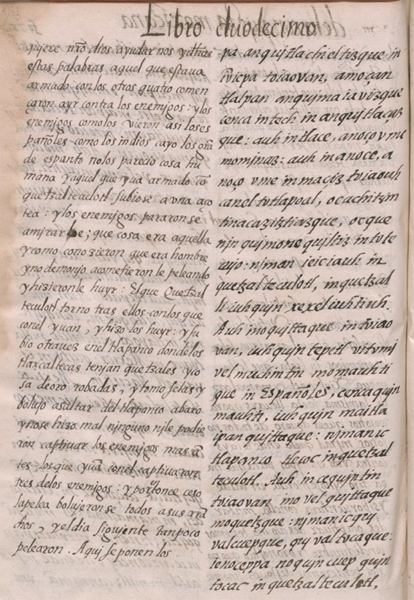Folio 78 verso
Translations and Transcriptions
Spanish Translation
[Translation of the Nahuatl into Spanish by Fr. Bernardino de Sahagún; transcription of the Spanish (left-hand column) by James Lockhart:] [f. 78v.] quiere n̄r̄o dios ayudarnos y đħas estas palabras aquel que estaua armado con los otros quatro començaron a yr contra los enemigos: y los enemigos como los vieron asi los españoles como los indios cayolos grāde espanto no los parecio cosa humana y aquel que yua armado cō quetzalteculotl subiose a vna açotea: y los enemigos pararonse a mirarle; que cosa era aquella y como conozieron que era hombre y no demonio acometieronle peleando y hizieronle huyr: El Quetzalteculotl* torno tras ellos con los que con el yuan, y hizolos huyr: y subio otra uez en el tlapanco donde los tlaxcaltecas tenian quetzales y cosa de oro robadas, y tomoselas y boluio a saltar del tlapanco abaxo y no se hizo mal ninguno ni le podieron captiuar los enemigos mas ātes los que yuā con el capituaron tres de los enemigos: y por entonce ceso la pelea boluieronse todos a sus rrāchos, y el dia siguiente Tanpoco pelearon. Aqui se ponen los** ---------- *QUETZALTECULOTL. In the manuscript, through inadvertence the que of this word was written twice. **AQUI SE PONEN LOS. In the manuscript, these words are inadvertently repeated at the beginning of fol. 79.
English Translation
[Translation of the Nahuatl (right-hand column) by James Lockhart:]
you are to aim it only at our enemies. You are not just to cast it on the ground, but hurl it very close to them. And if one or two of them are hit, or if one or two of our enemies are captured, then it is truly our fate that for a little while longer we will
Analytic Transcription
[Transcription of the Nahuatl (right-hand column) by James Lockhart:] [f. 78v.] pa anquitlachieltizque in īvicpa toiaovan, amo çan tlalpan anquimaiavizque cenca intech in anquitlaçazque: auh intla ce, anoço vme mominaz: auh in ano ce, anoço vme in maçiz toiaouh ca nel totlapoal, oc achitzin tinacazitztiazque, oc quenin quimonequiltiz in totecuio:* niman ie ic iauh in quetzalteculotl, in quetzalli iuhquin xexeliuhtiuh. Auh in oquittaque in toiaovan, iuhquin tepetl vitomi vel muchintin momauhtique in Españoles, cenca quinmauhti, iuhquin ma itla ipan quittaque: niman ic tlapanco tlecoc in quetzalteculotl. Auh in cequintin toiaovan in o vel quittaque moquetzque: niman ic quivalcuepque, quivaltocaque: ie no ceppa no quincuep quintocac in quetzalteculotl, ---------- *TOTECUIO. Several elements in the translation of the preceding speech are more than normally speculative.
Image

Spanish Translation
[Translation of the Nahuatl into Spanish by Fr. Bernardino de Sahagún; transcription of the Spanish (left-hand column) by James Lockhart:] [f. 78v.] quiere n̄r̄o dios ayudarnos y đħas estas palabras aquel que estaua armado con los otros quatro començaron a yr contra los enemigos: y los enemigos como los vieron asi los españoles como los indios cayolos grāde espanto no los parecio cosa humana y aquel que yua armado cō quetzalteculotl subiose a vna açotea: y los enemigos pararonse a mirarle; que cosa era aquella y como conozieron que era hombre y no demonio acometieronle peleando y hizieronle huyr: El Quetzalteculotl* torno tras ellos con los que con el yuan, y hizolos huyr: y subio otra uez en el tlapanco donde los tlaxcaltecas tenian quetzales y cosa de oro robadas, y tomoselas y boluio a saltar del tlapanco abaxo y no se hizo mal ninguno ni le podieron captiuar los enemigos mas ātes los que yuā con el capituaron tres de los enemigos: y por entonce ceso la pelea boluieronse todos a sus rrāchos, y el dia siguiente Tanpoco pelearon. Aqui se ponen los** ---------- *QUETZALTECULOTL. In the manuscript, through inadvertence the que of this word was written twice. **AQUI SE PONEN LOS. In the manuscript, these words are inadvertently repeated at the beginning of fol. 79.
English Translation
[Translation of the Nahuatl (right-hand column) by James Lockhart:]
you are to aim it only at our enemies. You are not just to cast it on the ground, but hurl it very close to them. And if one or two of them are hit, or if one or two of our enemies are captured, then it is truly our fate that for a little while longer we will
Analytic Transcription
[Transcription of the Nahuatl (right-hand column) by James Lockhart:] [f. 78v.] pa anquitlachieltizque in īvicpa toiaovan, amo çan tlalpan anquimaiavizque cenca intech in anquitlaçazque: auh intla ce, anoço vme mominaz: auh in ano ce, anoço vme in maçiz toiaouh ca nel totlapoal, oc achitzin tinacazitztiazque, oc quenin quimonequiltiz in totecuio:* niman ie ic iauh in quetzalteculotl, in quetzalli iuhquin xexeliuhtiuh. Auh in oquittaque in toiaovan, iuhquin tepetl vitomi vel muchintin momauhtique in Españoles, cenca quinmauhti, iuhquin ma itla ipan quittaque: niman ic tlapanco tlecoc in quetzalteculotl. Auh in cequintin toiaovan in o vel quittaque moquetzque: niman ic quivalcuepque, quivaltocaque: ie no ceppa no quincuep quintocac in quetzalteculotl, ---------- *TOTECUIO. Several elements in the translation of the preceding speech are more than normally speculative.
Image
